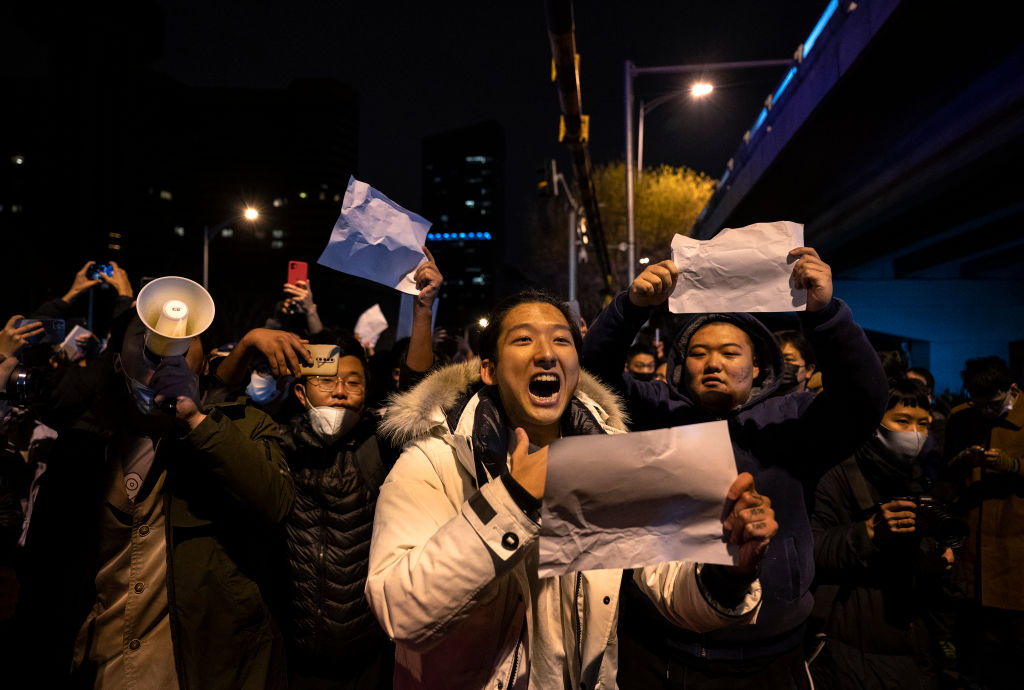China has become a bio-police state, but finally its citizens have had enough

The Chinese people have taken to the streets, and their message is clear: their government has lost the argument on its draconian zero-Covid strategy. Citizens would rather live alongside the rest of the world with the risk of the virus than continue to surrender their freedoms in a bio-police state. The sight of thousands of international football fans celebrating in stadiums in Qatar, without a face mask or testing station in sight, has broken the spell of the Chinese Communist Party’s propaganda. We are now in a new era.
The sight of these rare moments of social unrest in a deeply repressive state has been welcomed in the West. While they are significant and unusual, it is important to note the motivations behind the protests vary. This is not yet a democracy movement. That said, history tells us that grievances around specific government policies or economic conditions do have the potential to become wider movements coalescing around more abstract, vital human needs. Certainly, these protests will draw a response from the authorities commensurate with the risk of escalation to a more centrally organised and cohesive movement.
The disquiet about the seemingly interminable restrictions has been gathering pace over recent months. In October, a brave man unfurled a banner over a Beijing overpass, challenging President Xi Jinping to end the relentless cycle of Covid-19 lockdowns and restore freedom to the Chinese people. Protests of increasing violence have broken out in factories enforcing mandatory isolation on their workers, who already toil under challenging conditions to make consumer goods. At one of the largest factories making iPhones, workers climbed over fences to escape the factory compound. They are now being offered lucrative compensation from the factory owners and local authorities to return.
The Chinese authorities have created an intractable dilemma for themselves. The West excelled at creating highly effective vaccines at a record pace. China has refused to allow the provision of Western vaccines to its population and its Sinovac product remains vastly inferior, and with strikingly low coverage amongst the elderly. This is not helped by an already problematic ageing population. In 2019, 28 per cent of people in China were over the age of 60.
The CCP’s zero-Covid strategy has kept infections low, but also prevented the spread of immunity to the virus. Tearing off the zero-Covid plaster without any community resistance could create a short-term health crisis in a population made deeply fearful of the virus by government messaging. But as the Chinese people begin to push back against the deprivation of their freedoms, the government must choose between two pathways of social disorder.
Liberal nations have become attuned in recent years to the security risks posed by an increasingly confident China, and the friendship between President Xi and President Putin has become a source of greater alarm since Russia’s invasion of Ukraine. The West has watched the evolution of these autocratic regimes with deep concern, and at times we have not felt entirely convinced of the future of our mature democracies.
As with Putin’s miscalculations in the early stages of its Ukrainian campaign, this colossal tactical failure of the Chinese regime, which has caused untold misery for its population, makes a convincing case for the structural weaknesses inherent in authoritarian regimes. The strong hand with which Xi Jinping will seek to suppress these protests reflects the powerful and credible fear he perceives in free and open societies.
As the Chinese people take to the streets to champion these principles, we should draw confidence from their yearning to defend their future in the international order.
